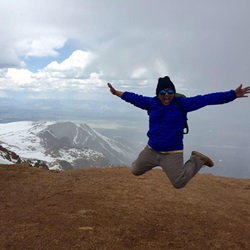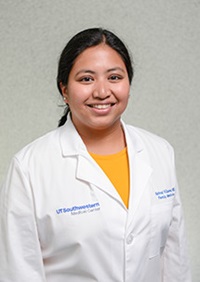The Liberal Arts are the Best Medicine: Bringing a Diverse Education to Family Practice
Astrud Villareal, M.D., ’10, a family practice physician and assistant professor at UT Southwestern Medical Center, chats with us about her SMU journey, how her liberal arts education has impacted her career, and what it takes to be successful in school, work, and medicine.
 Tell us a little bit about yourself! Where are you from? What do you do for fun? What do you do for work?
Tell us a little bit about yourself! Where are you from? What do you do for fun? What do you do for work?
I was born and raised in the Philippines before calling Dallas home. I’ve been here in Dallas since high school, and clearly, I’ve had difficulty parting ways with the city having spent my college, medical school, and family medicine residency years here! I’m currently an assistant professor at UT Southwestern Department of Family and Community Medicine, where my week is divided between seeing my own patients, teaching family medicine residents and medical students, and participating in activities like curriculum development and research.
For fun, like most people, I enjoy spending time with family and friends. Experiencing different cultures and cuisine through travel is also something I love to do (and I love making itineraries for my trips!). I would call myself a bit of a thrill/adventure seeker – I’ve had a chance to swim with sharks, participate in a controlled free fall off of a very tall building, and hike up an active volcano.
I have to ask: What drew you to SMU when you were deciding on a university?
The people at SMU made a huge impact on me when it was time to choose a place to call home for four years. Everyone I met on campus during my high school visits was so warm and kind, leaving me immediately with the sense of community. My uncertainty in really nailing down my four-year plan (I knew I wanted to do biology but was unsure about the rest) was met with understanding and excitement for what I would choose in the future. Aside from the people, the overall curriculum and opportunities on campus were also a huge draw. The number of exciting courses coupled with programs like the Tate Lecture Series gave me a sense that SMU wanted to really broaden the interests of its student body. Did I mention the campus yet? It is absolutely gorgeous, and walking through the boulevard as you go from one class to another is not bad either!
While at SMU, you majored in biology with minors in chemistry, human rights, and international studies. That’s an impressive combination! How did you decide to pursue those areas of study?
Great question! In the beginning, I knew I wanted to pursue something in the science realm. I enjoyed my science classes in high school. I think that was because for a naturally curious person, science had a lot of answers to my questions and also gave me more questions to ask, which was great. Chemistry was a natural complement to biology so that’s where that piece of the puzzle fits. I was not sure about pursuing medicine via the path of a physician or whether I should tackle it from a policy perspective, so this was where my international studies minor came into play. This area of study allowed me to see medicine in a broader context. It let me think about medicine not just scientifically, but also socioeconomically and politically, which I really enjoyed. I actually ended up spending a semester abroad in Denmark where I learned more about medical policy and eventually solidified that I wanted to be in a practice where I had a lot of time with patients. The human rights minor is something that I feel so blessed to have been a part of. I think if I started over at SMU now, I would definitely push to obtain the major. I completed this minor because I wanted to be an active participant in world affairs, which begins with learning about people and their histories. A key part in moving toward a better future involves learning about what areas we could have improved upon in the past. I think for me, this was one of the appeals of the human rights minor. It also gave me so much perspective and gratitude, given that not everyone affords the same rights that I enjoy in my everyday life. The classes in this minor focused on remembering and recognizing the dignity in people through their stories and sacrifices, and I’m just incredibly thankful to have had the experience.
Your educational career seems to be the epitome of a liberal arts education. What did you learn from exploring multiple disciplines? What skills and/or experiences did you gain that have contributed to your life and work post-grad?
I think this is a perfect time to thank SMU for the opportunities that it so kindly gave me during my four years there. The ability to explore different courses allowed me to see the world through various lenses and different perspectives, which has come in handy in my work as a physician. The people that I see in clinic or in the hospital all have a unique story and I have to approach all of them in a different way. My years at SMU equipped me with communication and critical thinking skills that I apply to my daily interactions with patients.
 How do you feel your liberal arts education has impacted your career as a physician?
How do you feel your liberal arts education has impacted your career as a physician?
Medicine is unique in that individuals constantly and consistently push themselves to be better on a day-to-day basis, but at the same time, it is a team sport and you heavily rely on others. My liberal arts education exposed me to interdisciplinary learning as well as critical thinking – skills that I heavily rely on in my current line of work. I usually have to involve an element of creativity in my work as well, whether that’s coming up with an interesting lesson plan for a session or figuring out a way to explain a complex plan to a patient. My liberal arts education prepared me for these instances. Last but certainly not least, having an understanding about different people’s backgrounds and stories enables me to work with them at a deeper and more effective level. I get to know them beyond their symptoms. Yes, I was able to hone these skills during medical school but their roots truly came from my liberal arts education at SMU.
Why and how did you decide on family medicine?
Family medicine provided me with the best opportunity to get to know people because it allows for continuity of care. It also enables me to learn about and care for them both when they are sick and well, which can be rare to find. The breadth and variety in family medicine was also a huge draw for me. I do not have a “routine” day which is fantastic for me! It presents new challenges and learning opportunities on a daily basis.
Choosing to train at UT Southwestern Family and Community Medicine was one of the easier choices for me. The patient variety and volume were certainly a huge plus to my learning, and the support from the people in the Department from day one was phenomenal.
What is the most exciting or satisfying aspect of working in family medicine? The most surprising?
Learning about people is definitely the most satisfying aspect of my work. Getting to know the person with the ailment or the medical concern is amazing. The thing that still surprises me is the importance of listening and how much my words can affect people; both are extremely humbling. I have had patient visits where me telling them that “it’s okay to be frustrated about this” or “I give you permission to not be in 100% control of everything” made a huge difference. It was not really the medication or test that I ordered but rather something embedded in my words. Likewise, listening is so important. In this job, it is easy to start putting the pieces of the puzzle together as the patient is speaking but we have to balance that tendency with truly just hearing what the person is saying.
What advice do you have to future physicians and students interested in pursuing medicine?
This question makes me think back to what others told me before I entered the field. I received lots of great advice so I hope I can pay that forward. I have a long list, but I’ll narrow it to three things:
1. Remember your why. Entering the field of medicine is a long commitment and it’s important to remember why you embarked on the journey in the first place. There will be times when it can be overwhelming or exhausting so remembering your why is essential. It will give you direction and purpose on days that are tough.
2. Set boundaries. I have learned to embrace this advice more and more as I continue in the field. Your job will always ask more from you, and most people will find it natural to continue to say yes, but it is healthy to set firm boundaries and say no sometimes.
3. Find mentors. In medicine, mentors are crucial to your successes. Great mentors will correct you when you’re deviating from your path and raise you up when you are doing well. They will even remind you to remember your why and set boundaries if you forget, so spend some time developing and cultivating those relationships.
How would you sum up the value of a liberal arts education as it relates to the professional workforce?
I think investing in a liberal arts education provides a person with tools that prepare them for their life after college – wherever that road may take them. The value of a person who has had a liberal arts education is seen in the skills that they bring to the workforce like interdisciplinary learning, creativity, and the ability to envision various perspectives (which hopefully brings kindness). Couple these skills with subject-focused ones like writing, design, or debate and you end up with a person who has tools to tackle anything! The diversity of experience that a graduate educated in the liberal arts brings to the table is an asset to any future endeavor they pursue.
Anything else you’d like to add?
Two things: Study abroad and take fun classes in college! Studying abroad was the best thing that I did during my four years. It allowed me to push myself outside of my comfort zone, and I walked away with friendships that have lasted my lifetime! Also, take fun classes because, really, when else will you do that for yourself?! I took Aikido [martial arts] and Classical Guitar and could not imagine what my college life would have been like without those classes! Work hard, but also set aside time for play!